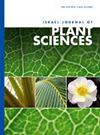Influence of Trichoderma spp on Macrophoma theicola branch canker disease in South Indian tea gardens, India
IF 0.9
4区 生物学
Q4 PLANT SCIENCES
引用次数: 0
Abstract
Branch canker disease caused by the fungus Macrophoma theicola is a major stem disease that reduces the yield of south Indian tea plantations. Hence the present study aimed to assess the efficacy of the biocontrol agent Trichoderma spp against various isolates of Macrophoma spp. For this matter, different tea-growing regions of south India were surveyed for the isolation and characterization of Macrophoma spp. Then, fungal biocontrol strains (Trichoderma viride, Trichoderma atroviride, Trichoderma harzianum, and Gliocladium virens) were procured from microbial type culture collection Centre (MTCC) to screen their antagonistic potential on different isolates Macrophoma spp. The spores of Macrophoma spp were examined through a light microscope and identified by their peculiar morphological features such as non-septum pycnidiospores present in the sac and oval shape spore with stalk and confirmed using 18S rRNA gene sequence. The results revealed that the biocontrol G. virens followed by T. harzianum showed a higher inhibitory effect on different isolates of Macrophoma spp in the dual plate and culture filtrate studies. In the well diffusion method, the fungal biocontrol agents were found to be exhibit non-significant differences on different isolates of branch canker pathogen. The hyphal interactions studies showed that the pathogenic hyphal wall shrunk and penetrated by the interaction of G. virens.木霉对印度南印度茶园巨瘤分枝溃疡病的影响
由真菌Macrophoma theicola引起的枝条溃疡病是降低南印度茶园产量的主要茎部疾病。因此,本研究旨在评估生防剂木霉(Trichoderma spp,从微生物型培养物收集中心(MTCC)获得真菌生防菌株(绿色木霉、萎缩木霉、哈茨木霉和绿脓杆菌),以筛选其对不同分离株Macrophoma spp的拮抗潜力。用光学显微镜对大孔藻的孢子进行了检测,并通过其独特的形态特征进行了鉴定,如囊中存在的非隔孢子和带柄的椭圆形孢子,并用18S rRNA基因序列进行了确认。结果表明,在双平板和培养滤液的研究中,生防菌G.virens和T.harzianum对不同分离株的Macrophoma spp表现出较高的抑制作用。在井扩散法中,真菌生物防治剂对不同菌株的分枝溃疡病病原体表现出不显著的差异。菌丝相互作用研究表明,病原菌菌丝壁在病毒的相互作用下收缩和穿透。
本文章由计算机程序翻译,如有差异,请以英文原文为准。
求助全文
约1分钟内获得全文
求助全文
来源期刊

Israel Journal of Plant Sciences
生物-植物科学
CiteScore
1.90
自引率
0.00%
发文量
17
审稿时长
>12 weeks
期刊介绍:
The Israel Journal of Plant Sciences is an international journal of extensive scope that publishes special issues dealing with all aspects of plant sciences, including but not limited to: physiology, cell biology, development, botany, genetic
 求助内容:
求助内容: 应助结果提醒方式:
应助结果提醒方式:


